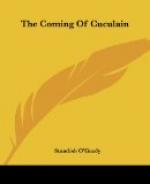While Sualtam and his people feasted, the harper harped and trained singers sang. Every day the floor was strewn with fresh rushes or dried moss or leaves. Every night at a certain hour the bed-makers went round spreading couches for the people of Sualtam. Sometimes the king slept with his people in the great hall. Then one warrior sat awake through the night at his pillow having his sword drawn, and another warrior sat at his feet having his sword drawn. The fire-place was in the midst of the hall. In winter a slave appointed for that purpose from time to time during the night laid on fresh logs. Rude plenty never failed in the dun of Sualtam. In such wise were royal households ordered in the age of the heroes. For the palace, it was of timber staunched with clay and was roofed with rushes. Without it was white with lime, conspicuous afar to mariners sailing in the Muirnict. [Footnote: The Irish Sea or St. George’s Channel. Muirnict means the Ictian Sea.] There was a rampart round the dun and a moat spanned by a drawbridge. Before it there was a spacious lawn. Down that lawn there ever ran a stream of sparkling water. Setanta sailed his boats in the stream and taught it here to be silent, and there to hum in rapids, or to apparel itself in silver and sing liquid notes, or to blow its little trumpet from small cataracts.
CHAPTER IV
SETANTA RUNS AWAY
“For a boy’s way is the wind’s way.”
—Longfellow
And now the daily life of that remote dun no longer pleased the boy, for the war-spirit within drave him on. Moreover he longed for comrades and playfellows, for his fearful mother permitted him no longer to associate with children of that rude realm whose conversation and behaviour she misliked for her child. She loved him greatly and perceived not how he changed, or how the new years in their coming and their going both gave and took away continually.
In summer the boy sat often with the chief bard under the thatched eaves of the dun, while the crying swallows above came and went, asking many questions concerning his forefathers back the ascending line up to Rury, and again downwards through the ramifications of that mighty stem, and concerning famous marches and forays, and battles and single combats, and who was worthy and lived and died well, and who not. More than all else he delighted to hear about Fergus Mac Roy, who seemed to him the greatest and best of all the Red Branch. In winter, cradled in strong arms, he listened to the reminiscences and conversation of the men of war as they sat and talked round the blazing logs in the hall, while the light flickered upon warlike faces, and those who drew drink went round bearing mead and ale.
Upon his seventh birthday early in the morning he ran to his mother and cried, “Mother, send me now to Emain Macha, to my uncle.”




